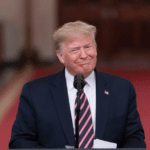




As the trial of former President Donald Trump has begun, The New York Post delved into the history of the case and how Manhattan District Attorney Alvin Bragg created this landmark case that has become the center of the presidential race.
Bragg's case stems from a payment made to Stormy Daniels before the 2016 election, and he is trying to misdemeanor charges into felonies. The case was so weak it was rejected by federal prosecutors but Bragg is a true blue radical determined to prosecute Trump.
The case revolves around a $130,000 payment made to adult film actress Stormy Daniels, aimed at preventing her from disclosing a past affair during the climax of the 2016 Presidential campaign. This payment, though initially categorized under personal legal expenses, is central to the allegations against Trump.
Prior to Bragg's intervention, other prosecutors, including the federal level and Bragg’s predecessor, opted not to pursue this case because of its inherent flimsiness. The concerns were manifold - not only the national uproar it might cause but also the ambiguity in classifying the hush money as a personal expense or a campaign expenditure.
Nonetheless, Bragg was determined to take Trump down by any means necessary even if it meant making a huge legal reach.
The payment to Daniels was executed through Trump’s then-lawyer, Michael Cohen, who later confirmed the payment and alleged reimbursement by Trump in 2017. Critics of the case, however, have pointed out the problematic reliance on Cohen's testimony given his history of perjury.
The connection of these events to the 2016 election has also stretched the statute of limitations, which typically would not extend far enough to encompass actions from 2017 in a straightforward legal scenario.
Yet, Bragg’s approach was to classify each act related to the payment as a distinct felony, under the assertion that they were in furtherance of another crime - namely a violation of federal campaign finance laws.
This inventive legal interpretation allowed Bragg to extend the statute of limitations and brought a total of 34 felony charges against Trump based mainly on the recording of these financial transactions. This bold move by Bragg has led to a meticulous examination of the legality and implications of such an action.
Some view this as a strategic yet controversial use of the law to hold powerful figures accountable, while others criticize it for potentially setting a dangerous precedent.
An overriding concern is whether these tactics might encourage similar prosecutions in the future, possibly chilling political engagement or stretching legal boundaries.
The case has not been without its critics, particularly regarding the potential misuse of judicial power to engage in politically charged prosecutions. The reliance on Cohen, along with the unprecedented nature of charging a former president over a nominal business records issue, has heightened these concerns.
Moreover, Bragg’s perceived inconsistency in prosecuting violent misdemeanors leniently while aggressively targeting financial discrepancies has been highlighted as a point of controversy.
Ultimately, anything short of a clear victory could severely tarnish Bragg's reputation and be seen as an embarrassing overreach by the Manhattan District Attorney's Office.
In summary, Alvin Bragg’s decision to prosecute Donald Trump features an ambitious use of the legal system to redefine misdemeanor charges into serious felonies. The case tackles complex issues around campaign finance laws, the limits of legal statutes, and the potential bias in prosecutorial discretion.
The outcomes of this trial could not only affect the future of Trump but might also influence the landscape of political accountability in the United States. It remains to be seen whether Bragg’s bold strategy will set a new standard or become a cautionary tale in legal and political circles.



